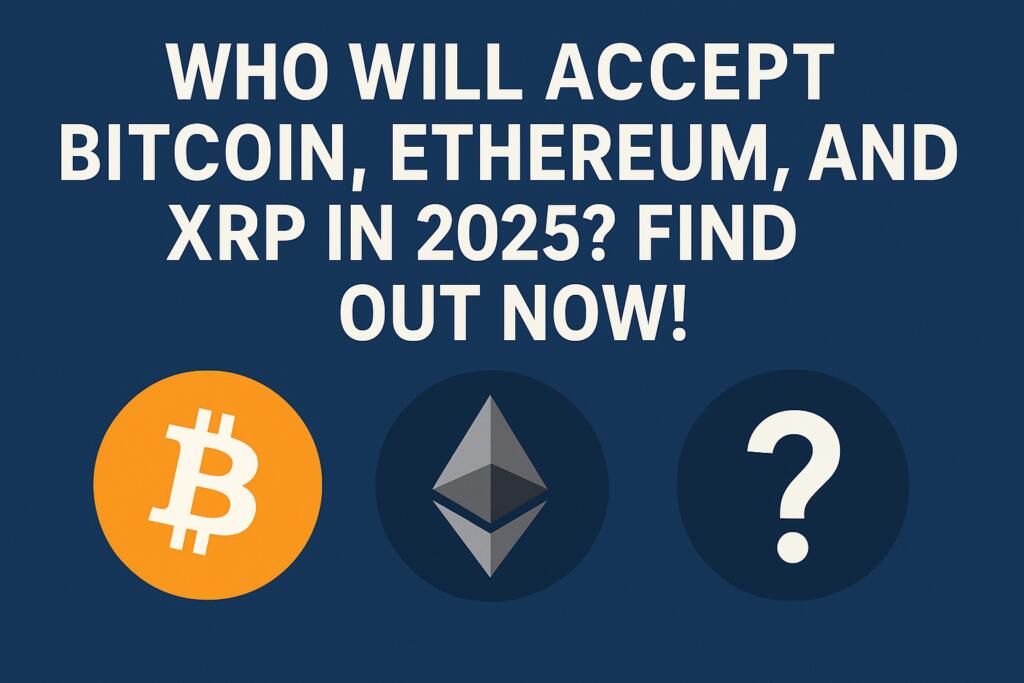Cryptocurrency adoption continues to accelerate across diverse sectors in 2025, with prominent brands and industries embracing digital assets not only as a store of value but also as a practical means of payment. From everyday coffee shops to luxury car dealerships, the integration of Bitcoin, Ethereum, and XRP into mainstream transactions signals a significant shift toward a crypto-enabled economy. As infrastructure and regulatory environments mature, more small businesses and global companies are making it simpler to spend and accept cryptocurrencies, further embedding blockchain into daily life and commerce.
- Major retailers, restaurants, and coffee shops now accept cryptocurrencies like Bitcoin, Ethereum, and XRP through apps and third-party payment processors.
- Travel platforms and airlines are increasingly enabling crypto payments for bookings, flights, and luxury travel experiences.
- High-end brands and luxury car dealers are integrating crypto payments for premium goods and real estate purchases.
- Payment processors facilitate seamless crypto acceptance for small businesses by instant conversion and reduced compliance complexities.
Cryptocurrencies have evolved from niche assets to integral components of modern financial systems by 2025. Bitcoin (BTC), Ethereum (ETH), and XRP (XRP) are now common options for both everyday spending and strategic investments. Their combined strengths—Bitcoin as a value store, Ethereum’s robust smart contract ecosystem, and XRP’s efficiency in cross-border payments—make them versatile tools for businesses seeking to leverage blockchain technology.
Everyday crypto transactions: Coffee shops, restaurants, retailers
For many crypto holders, making daily purchases with digital assets is becoming routine. Acceptance of Bitcoin, Ethereum, and XRP extends from coffee shops to supermarkets, with various apps and platforms simplifying these transactions. XRP tends to be more prominent in backend and cross-border payment solutions, leaving fewer POS options for direct retail acceptance.
Coffee shops and small eateries
In 2025, paying for coffee with crypto is no longer a sci-fi concept. Chain giants like Starbucks facilitate crypto payments via gift cards, allowing customers to use Ether or Bitcoin for their favorite beverages. Digital wallets such as Flexa’s SPEDN make crypto-to-cash conversions straightforward at checkout. Smaller independent vendors and convenience stores—including Sheetz—also accept Bitcoin, Ether, and other cryptocurrencies, making everyday transactions faster and more flexible.
Restaurants and fast food places
Crypto-friendly zones now include select McDonald’s outlets, where Bitcoin payments are possible via dedicated apps. Chains like Subway and Burger King often rely on third-party gift card services, enabling customers to spend their crypto with minimal fuss. Steak ‘n Shake notably expanded BTC acceptance nationwide in 2025, attributing an 11% sales increase to this move. Other fast-food giants such as Chipotle and Baskin-Robbins also accept crypto payments through BitPay, making digital currencies more practical for quick meals and treats.
Retail and online stores
Tech giants are integrating crypto into their payment systems: AT&T allows bill payments with ETH or BTC, while Microsoft accepts Bitcoin directly or through processors. E-commerce platforms like Shopify have simplified crypto acceptance for millions of merchants. Big-box retailers such as Home Depot, Lowe’s, and Ikea utilize Bitrefill or BitPay gift cards for crypto-based purchases, from home renovation supplies to electronics. AMC Theatres accepts Bitcoin, Ethereum, and XRP for tickets and entertainment content, further extending crypto’s retail reach.
Scaling up: Travel and luxury
The travel industry is adopting cryptocurrencies for booking flights, hotels, and luxury experiences. Platforms like Travala.com enable users to pay with BTC, ETH, and other assets. Major airlines, including Emirates and AirBaltic, have incorporated crypto payments; Emirates plans to accept crypto through partnerships with providers like Crypto.com. Luxury brands and high-end car dealerships—such as Post Oak Motor Cars—now accept Bitcoin for premium purchases, reflecting growing demand for crypto in the luxury market. Brands like Gucci and Ralph Lauren have expanded their crypto payment offerings at flagship stores, signaling broader acceptance among high-net-worth consumers.
Financial services, remittances, and institutional use
Beyond consumer transactions, blockchain is transforming cross-border remittances, treasury management, and institutional holdings. XRP, with its fast settlement capabilities, remains favored for remittances, while companies like Mercury FX trial XRP for cost-effective transfers. Payment gateways like PayPal, BitPay, and NOWPayments facilitate seamless cryptocurrency acceptance for businesses, reducing exposure to volatile prices. Some firms, including BitMine and VivoPower, hold cryptocurrencies to hedge against inflation and optimize treasury strategies, showing increasing corporate adoption.
How can small businesses adopt crypto payments?
Step 1: Choose a payment processor
Platforms like BitPay, Coinbase Commerce, and CoinGate streamline crypto integration for SMBs. They automatically convert digital assets into fiat currency, mitigating volatility risk and simplifying accounting.
Step 2: Reduce compliance costs
Automated tax reporting tools and clearer regulatory frameworks help lower the legal and financial burdens on small enterprises, making crypto acceptance more feasible.
Step 3: Embrace a broader range of assets
Lower technical barriers and improved compliance enable businesses to confidently accept other cryptocurrencies beyond Bitcoin, Ethereum, and XRP, diversifying their options.
This article does not constitute investment advice. Cryptocurrency trading and acceptance involve risks; thorough research is essential before engaging in these activities.



